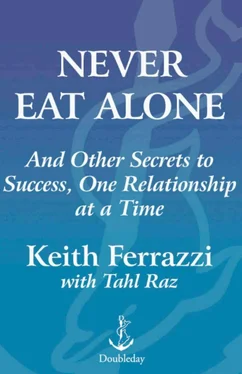Keith Ferrazzi - Never Eat Alone
Здесь есть возможность читать онлайн «Keith Ferrazzi - Never Eat Alone» весь текст электронной книги совершенно бесплатно (целиком полную версию без сокращений). В некоторых случаях можно слушать аудио, скачать через торрент в формате fb2 и присутствует краткое содержание. Год выпуска: 2005, ISBN: 2005, Издательство: C U R R E N C Y • D O U B L E D A Y, Жанр: marketing, на английском языке. Описание произведения, (предисловие) а так же отзывы посетителей доступны на портале библиотеки ЛибКат.
- Название:Never Eat Alone
- Автор:
- Издательство:C U R R E N C Y • D O U B L E D A Y
- Жанр:
- Год:2005
- ISBN:0-385-51529-4
- Рейтинг книги:4 / 5. Голосов: 1
-
Избранное:Добавить в избранное
- Отзывы:
-
Ваша оценка:
- 80
- 1
- 2
- 3
- 4
- 5
Never Eat Alone: краткое содержание, описание и аннотация
Предлагаем к чтению аннотацию, описание, краткое содержание или предисловие (зависит от того, что написал сам автор книги «Never Eat Alone»). Если вы не нашли необходимую информацию о книге — напишите в комментариях, мы постараемся отыскать её.
Never Eat Alone — читать онлайн бесплатно полную книгу (весь текст) целиком
Ниже представлен текст книги, разбитый по страницам. Система сохранения места последней прочитанной страницы, позволяет с удобством читать онлайн бесплатно книгу «Never Eat Alone», без необходимости каждый раз заново искать на чём Вы остановились. Поставьте закладку, и сможете в любой момент перейти на страницу, на которой закончили чтение.
Интервал:
Закладка:
I called Michael Johnson when I got home from my travels and, unsurprisingly, got a neutral to cold reception.
"I'm sorry, Mr. Johnson is traveling, and he'll be gone all month," his administrative assistant told me.
"That's okay," I replied. "Why don't you tell him a friend of Jane Pemberton's called. Please tell him to call me back when he gets a chance."
With a first call you don't want to come off as aggressive. Remember, you never, ever want to anger the gatekeeper.
My second call was more of the same: establishing my presence and making it known I wouldn't go away.
"Hi, this is Keith Ferrazzi. I'm just calling back because I haven't heard from Michael." Here, again, without being too pushy, you begin to create the presumption that his return call is imminent and expected. Johnson's gatekeeper politely took down my message and thanked me for calling. I asked for his e-mail address, but she wouldn't give it to me, stating privacy concerns.
On the third attempt, she was less polite. "Listen," she told me with a little edge in her voice, "Mr. Johnson is very busy and I don't know who you are." Now, I could either match her tone and this would spiral downward, or . . .
"Oh, I'm really sorry, I'm a personal friend of a friend of his. I just moved into the city, and Jane suggested that I should meet Michael, and honestly, I don't even know why besides the fact that Jane is a good friend of Michael's. Maybe you're right. Maybe it's all wrong. Maybe Michael doesn't know Jane well and he wouldn't want to meet me. I apologize if this is the case."
By being so candid and even vulnerable, I put the assistant on alert. She now fears that perhaps she's been too gruff, perhaps inappropriate, to a friend of a friend of her boss. After all, I'm just a guy following a friend's advice. Most likely she'll back off, worried that she's closed the gate too tight. Then I made a suggestion: "Why don't I just send Michael an e-mail?" And at this point, she's thinking, "I want to be out of the middle of this thing." So, finally, I got his e-mail address.
The e-mail I sent was simple: "Dear Michael, I'm a friend of Jane's, and she suggested I talk with you . . . Jane thinks we should know each other." If I had had something specific to discuss, I would have put it right up front, but the best value proposition I had was the mutual friend who felt this would be a win-win.
It's sometimes effective to utilize several forms of communication when trying to reach an important new contact. An e-mail, letter, fax, or postcard often has a better chance of landing directly in the hands of the person you're trying to reach.
Johnson's reply was cordial and short. "When convenient, I'd be happy to meet."
So I went back to his assistant with the information that Michael said he'd be happy to meet and that I was now calling to find out when. And finally, we did in fact meet.
Situations that call for this amount of maneuvering are, unfortunately, not rare. It's real work and it takes a finesse that only practice, practice, practice can master. But once you recognize the importance of gatekeepers, and turn them into allies with respect, humor, and compassion, there will be few gates that aren't open to you.
11. Never Eat Alone
The dynamics of a network are similar to those of a would-be celebrity in Hollywood: Invisibility is a fate far worse than failure. It means that you should always be reaching out to others, over breakfast, lunch, whatever. It means that if one meeting happens to go sour, you have six other engagements lined up just like it the rest of the week.
In building a network, remember: Above all, never, ever disappear.
Keep your social and conference and event calendar full. As an up-and-comer, you must work hard to remain visible and active among your ever-budding network of friends and contacts.
Let me give you an example of what I mean. A few years back, I got the opportunity to travel with then First Lady Hillary Clinton on a C130 troop carrier, crisscrossing the Southwest from one political event to another. She was up at 5 in the morning for breakfast and phone calls back to the East Coast. She gave at least four or five speeches, attended a few cocktail parties where she constantly reached out to scores of individuals, and visited several people's homes. She must have touched 2,000 hands that day alone. At the end of the night, when most of our entourage struggled to get back on Air Force One, she huddled her staff, sat up cross-legged, and began to joke and chitchat with them about all that happened that day. An hour or so of frivolity, and Mrs. Clinton moved on to scheduling the next day. No matter what your politics, you have to respect that kind of determination and sheer work ethic. I was shocked by the number of individuals she remembered by name along the trip. I was having a tough enough time with remembering everyone's name in our group.
I see examples of this kind of persistence and determination everywhere. My particular heroes, because of my background, are those people who came from humble origins. A fellow CEO friend came from a blue-collar family in the Midwest—his father, like mine, was a laborer for forty-odd years. He'll tell you he isn't the smartest guy in the room, he doesn't have the Ivy League pedigree of his colleagues, and he hasn't climbed the greasy pole by getting a boost from his family. But today, he is one of the most respected CEOs in his industry.
His formula is not complicated, but it is rigorous. He talks to at least fifty people each day. He spends hours a week walking his company plant talking to employees up and down the ladder. If you send an e-mail to him or his assistant, you can be sure there will be a response within hours. He attributes his success to the blue-collar work ethic and sensibilities he was raised with by his father. About his more starched white-collar colleagues, he once told me that while he had learned what these people know, they would never have an opportunity to learn what he knew.
Now, you have to work hard to be successful at reaching out to others, but that doesn't mean you have to work long. There is a difference. Some people think building a network requires eighteen-hour days slogging through meetings and phone calls. If I'm slogging, or even if it feels like slogging, I'm not doing my job—at least not well. Or perhaps I'm in the wrong job. Building a network of friends and colleagues is about building relationships and friendships. It should be fun, not time-consuming. When your network is set, your goals written down, you'll find plenty of hours during the day to do what needs to be done.
How do I meet everyone I want to meet during the course of a week? Someone once remarked cynically, "I'd have to clone myself to take all the meetings you take."
"Ah, you're onto something," I responded. "I don't clone myself. I clone the event."
Here's what I mean. A few months ago, I flew into New York for a two-day business stint. There were a number of people I wanted to see: an old client and friend of mine who was the former president of Lego and was now trying to figure out what he wanted to do with the rest of his life, the COO of Broadway Video, with whom I wanted to discuss a new branded entertainment TV show for one of my clients, and a close friend that I hadn't seen in too long.
I had two days, three people I wanted to see, and only one available time slot to see them all. How do you manage a situation like this?
I "cloned" the dinner and invited all of them to join me. Each would benefit from knowing the others, and I'd be able to catch up with all of them and perhaps even get some creative input about the new TV show. My friend, who has a fantastic sense of humor, would enjoy the group and add a little levity to what might have been just a stodgy business meeting.
Читать дальшеИнтервал:
Закладка:
Похожие книги на «Never Eat Alone»
Представляем Вашему вниманию похожие книги на «Never Eat Alone» списком для выбора. Мы отобрали схожую по названию и смыслу литературу в надежде предоставить читателям больше вариантов отыскать новые, интересные, ещё непрочитанные произведения.
Обсуждение, отзывы о книге «Never Eat Alone» и просто собственные мнения читателей. Оставьте ваши комментарии, напишите, что Вы думаете о произведении, его смысле или главных героях. Укажите что конкретно понравилось, а что нет, и почему Вы так считаете.












